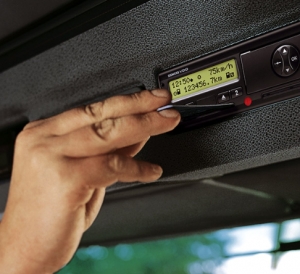Test Owner
Vehicle License Categories
Understanding the key terminology and legal requirements for goods vehicles is essential for both drivers and operators in the UK. From vehicle weight limits to licence categories, staying informed ensures compliance with regulations and promotes road safety. This guide outlines the critical aspects of goods vehicle operations, including maximum authorised mass (MAM), licence classifications, and axle weight restrictions, helping you navigate the rules that govern the use of commercial vehicles on UK roads.
Goods Vehicle Terminology
- MAM (Maximum Authorised Mass): Equivalent to Gross Vehicle Weight (GVW)
- GVW (Gross Vehicle Weight): Total vehicle weight including the load
- GTW (Gross Train Weight): Weight of the vehicle, trailer, and load combined
- RFS (Road Friendly Suspension): Air or air-equivalent suspension systems
Goods Vehicle Licence Categories
- B: Vehicles up to 3,500kg MAM with up to eight passenger seats (plus driver). Includes trailers under 750kg or with a combined MAM below 3,500kg
- B+E: Category B vehicles with trailers
- Before 19 January 2013: Any size trailer within towing limits
- After 19 January 2013: Trailers up to 3,500kg MAM within vehicle towing limits
- C1: Vehicles between 3,500kg and 7,500kg MAM, with trailers up to 750kg
- C1+E: C1 vehicles with trailers over 750kg, combined MAM up to 12,000kg
- C: Vehicles over 3,500kg MAM, including trailers up to 750kg
- C+E: Category C vehicles with trailers over 750kg
Maximum Goods Vehicle Weights
Rigid Vehicles
- 2 axles: 18,000kg
- 3 axles: 26,000kg*
- 4 axles: 32,000kg, axle spread of at least 6.4m*
Drawbar Combinations
- 26,000kg: Three axles**
- 36,000kg: Four axles**
- 44,000kg: Six axles with RFS, driving axles not exceeding 8.5 tonnes or with twin tyres
Articulated Combinations
- 26,000kg: 2+1 axles
- 44,000kg: Six-axle combination (on intermodal work)
Maximum Axle Weights
- Single (non-driving): 10,000kg
- Single (driving): 11,500kg
- Tandem (driving): 19,000kg
- Tri-axle bogie: 24,000kg
*Driving axles must have twin tyres and RFS or not exceed 9.5 tonnes
Disclaimer
This information has been gathered from sources including GOV.UK and RoSPA. Although every effort has been made to ensure accuracy, Quicktemp and its affiliates accept no liability for any errors or omissions.
Tachographs
Tachographs track driving time, speed, and distance. There are two types—analogue and digital—with digital tachographs mandatory for all commercial vehicles registered after 1 May 2006 (unless exempt). These devices ensure drivers and employers comply with regulations on driving hours.
Digital tachographs store data securely in the vehicle unit (VU) and the driver’s smart card, with advanced security features to prevent tampering.
Exemptions
Certain vehicles are exempt, including:
- Vehicles limited to speeds under 40 km/h
- Emergency and breakdown services within 100 km of base
- Non-commercial vehicles under 7.5 tonnes
For more details, visit the gov.uk website.
Digital Tachographs
The VU has a display, printer, controls, and two card slots. It stores data for around 365 days, displaying information in real-time. Since April 2015, the legal limit for downloading vehicle data has increased to 90 days. The system warns drivers when 4¼ hours of driving without a break has occurred and again at 4½ hours.
Driver Responsibilities
Drivers must use the tachograph every day to record driving time, work periods, availability, and breaks. Records for the current day and the last 28 days must be carried and presented to enforcement officers if requested. Tachograph records should be submitted to your Quicktemp office or client within 30 days.
Using Digital Tachographs
- Ensure the tachograph is calibrated
- Carry enough print rolls and check the mode switch is correctly set
- Report faults to the operator and make manual entries if the card is lost, damaged, or malfunctioning
- Keep printouts of driving activities and hand them to the operator
Driver Cards
Drivers need a valid driver card, issued by the DVLA, to operate digital tachographs. Cards are valid for five years and store up to 28 days of data, including vehicle usage, duty periods, and roadside checks.
Lost, Damaged, or Stolen Cards
If a card is lost, stolen, or malfunctioning, notify the DVLA immediately and apply for a replacement within seven days. You can continue driving for up to 15 days using manual entries, but must submit printouts at the start and end of each journey. The printouts must include the driver’s name and driving licence number.
Log On/Off Procedures
Log On
- Insert the driver card with the chip facing up.
- Follow on-screen instructions for manual entries if required.
- Select your country, and the card pictogram will confirm the logon.
Log Off
- Press the eject button and select your country.
- The system will ask if you need a printout.
- The driver card is then released.
Analogue Tachographs
For analogue tachographs, drivers must ensure the clock is set to the correct UK local time before driving. Fill out the chart completely with start/finish locations, dates, and odometer readings. Carry charts for the current day and the previous 28 days.
What Drivers Must Carry
Drivers must always carry
- Tachograph Driver Card
- Driver Qualification Card (CPC)
- 28 days of work and rest history
- Driving Licence
- Sufficient print rolls for the tachograph
- Defect reports for the vehicle
If the tachograph is faulty or records are inaccurate, drivers must make handwritten entries on the printout.
Disclaimer
This information has been compiled using resources from GOV.UK and RoSPA. While every effort has been made to ensure its accuracy, Quicktemp and its associated entities accept no responsibility for any errors or omissions.
Speed Limits
In today’s fast-paced world, we’re often impatient for things to happen quickly. However, when driving, it’s crucial to manage your speed and stay in control. Road safety charity Brake estimates that reducing average speeds by just 1 mph can lower crash rates by 5%. For professional drivers, who spend the majority of their workday on the road, the risks are even higher.
In 2016, over 1,700 people were killed on UK roads, an average of nearly five fatalities per day. It's important to remember that speed plays a huge role in these accidents, and responsible driving can help reduce these numbers.
Key Stats and Tips
- A pedestrian hit at 40 mph is 90% likely to be killed, but at 20 mph they have a 90% chance of survival
- In 2015, 222 deaths involved crashes where speed limits were exceeded
- Speed limits are not targets; adjust your speed based on road conditions. In 2015, 167 people died from driving too fast for the conditions
- On 30 mph roads, 45% of drivers exceed the limit, while 46% of drivers exceed the 70 mph limit on motorways
- Braking distances vary with speed and load, so adjust your driving accordingly
- Smoother, slower driving saves fuel and can prevent accidents
Know Your Limits
While no speed is completely safe, driving slower and observing speed limits can reduce road casualties. Vans over 2 tonnes must adhere to lower speed limits on single and dual carriageways, and those over 7.5 tonnes face restrictions on motorways.
Speed Limiters
Speed limiters restrict a vehicle's maximum speed by controlling fuel supply. They are required for vehicles with more than eight passenger seats or goods vehicles over 3.5 tonnes. Many limiters are set at 56 mph to improve fuel efficiency.
Disclaimer
This information has been compiled using resources from GOV.UK and RoSPA. While every effort has been made to ensure its accuracy, Quicktemp and its associated entities accept no responsibility for any errors or omissions.
Safe Reversing
Nearly 60% of commercial vehicle accident claims involve reversing, with HGVs accounting for 19%, vans 15%, and company cars 10%. Despite the low speed involved, reversing remains a significant hazard. Shockingly, almost a quarter of all workplace vehicle-related deaths occur during reversing.
Even experienced drivers need extra care when reversing in tricky situations. With attention to detail and a few simple precautions, we can help reduce these accidents.
Before Reversing
- Walk around the vehicle to identify hazards and ensure the path is clear
- Check for pedestrians and workers, ensuring they are out of the way
- Check height and ground clearance for obstructions
- Alert others by using hazard lights or sounding your horn
- Minimise reversing distance – if you can avoid reversing a long way, do so
- Be cautious of children and others who may be unaware of your actions
When Reversing
- Use a trained signaller (banksman) to guide you. Ensure you understand their signals and stop if you lose sight of them
- Reverse into spaces rather than out into traffic
- Follow floor guidelines to position your vehicle
- Reverse slowly, stopping if your view is obstructed or you’re unsure of distances
Common Reversing Accident Locations
- Collection and delivery points (52%)
- On site (29%)
- On route (15%)
- At the depot (4%)
Site Safety Measures
Some organisations have safety provisions to assist with reversing:
- One-way systems to reduce the need for reversing
- Fixed mirrors and barriers to increase visibility and stop vehicle movement
- Wheel stops and buffers to prevent vehicles from reversing into structures
Vehicle Safety Devices
- External mirrors and CCTV systems to improve rear visibility
- Reversing alarms (audible or flashing) to alert others
- Sensing systems to warn the driver or stop the vehicle if an obstruction is detected
This information is intended as a helpful guide only. Always stay alert and follow best practices to ensure safe reversing at all times.
Disclaimer
This information has been gathered from sources including GOV.UK and RoSPA. Although every effort has been made to ensure accuracy, Quicktemp and its affiliates accept no liability for any errors or omissions.
Manual Handling
Safe Lifting Guidelines
- Plan Ahead
Think before you lift. Know where the load is going and use handling aids if available. If the load is heavy or awkward, get help. Clear any obstacles and, for longer lifts, consider resting the load partway on a table or bench to adjust your grip - Foot Positioning
Stand with your feet apart, one foot slightly ahead of the other, to maintain balance and stability - Maintain Good Posture
Bend your knees slightly and keep your back straight. Avoid squatting or stooping. Lean forward a bit to get a good grip, but keep your shoulders and hips aligned - Get a Secure Grip
Keep your arms inside the boundary formed by your legs. A hook grip (curved fingers) is less tiring and more secure than a straight finger grip. Adjust your grip smoothly if needed during the lift - Keep the Load Close
Hold the load close to your body, keeping the heaviest side near your torso. If the load is far away, slide it towards you before lifting - Lift Smoothly
Avoid jerking the load—lift in a controlled and steady motion - Move Your Feet
Turn by moving your feet, not twisting your back - Keep Your Head Up
Look forward while lifting and handling, not down at the load, once it’s secured
Disclaimer
This information has been gathered from sources including GOV.UK and RoSPA. Although every effort has been made to ensure accuracy, Quicktemp and its affiliates accept no liability for any errors or omissions.
Safe and Secure Loading
Failure to properly secure a load can lead to serious injuries or even fatalities, putting not only the driver but also other road users, pedestrians, and workers at risk. A poorly secured load may shift during transit, affecting vehicle stability, increasing the risk of rollover, and becoming a hazard during unloading.
Risks of Poor Load Securing
- Loads may shift during braking or cornering, affecting vehicle handling
- Unstable loads can fall out when the vehicle is opened, endangering those unloading
- Even without injuries, damage to the load and vehicle can be costly
Who is Responsible
Both drivers and those loading vehicles must ensure that the load remains secure and stable throughout the journey.
- Risk Assessment: Loading and unloading should always be subject to a risk assessment and carried out by trained personnel
- Proper Equipment: Use suitable vehicles and securing equipment. Don't rely solely on the load’s weight to keep it stable
Load Securing Equipment
The right securing equipment depends on the type of load. Options include:
- Clamps, chains, steel wire ropes, webbing harnesses, nets, storing bars, and special bolts
All securing tools must be regularly inspected for wear and damage, especially items like webbing and ropes that are subject to wear from frequent use.
30-Second Safety Reminders
- Check the Load: Ensure the vehicle can handle the weight, size, and type of the load
- Handling Impact: Remember that load size and weight will affect vehicle handling
- Regular Inspections: Always check the load before setting off and at regular intervals during the journey
- Safety Procedures: Have clear safety procedures in place for loading and unloading
Don’ts
- Don’t overload the vehicle or its axles
- Don’t position loads too far back, as this reduces weight on the steered axles
- Never move the vehicle until the load is fully secured
- Avoid climbing onto the vehicle or load without proper safety measures
Legal Responsibilities
The Road Traffic Act (1991) makes it clear that using a vehicle with an unsafe load is illegal. The Health & Safety at Work Act (1974) and Workplace Regulations (1992) further reinforce the need for safe loading and unloading processes.
Load Securing Guidelines
- Pre-Check the Vehicle: Ensure that the load platform, bodywork, and anchorage points are in good condition
- Low Centre of Gravity: Keep the centre of gravity low by placing heavier items near the bottom and centre of the vehicle
- Distribute Weight Evenly: Use pallets or boards to evenly spread the weight across the vehicle platform, especially with smaller, heavier loads
- Tie it Down: Use anchorage points attached to the chassis to secure loads, not rope hooks. Place loads in contact with the headboard where possible, or fill gaps with empty pallets to prevent sliding
The Cost of Failure
Each year, around 4,000 successful prosecutions are made for unsafe loads, with penalties including fines up to £5,000, three penalty points, and potential disqualification. Apart from safety risks, the financial and operational costs of improperly securing a load are significant.
Conclusion
Ensuring that loads are properly secured not only helps to prevent accidents but also avoids expensive damage to both loads and vehicles. It's a simple yet essential step that can save lives and reduce liability.
Disclaimer
This information has been gathered from sources including GOV.UK and RoSPA. Although every effort has been made to ensure accuracy, Quicktemp and its affiliates accept no liability for any errors or omissions.
Highway Code
The Highway Code is a must-read for everyone using the road, especially professional drivers. It applies across England, Scotland, and Wales, with a different version for Northern Ireland. Following the Code not only improves road safety but also helps you avoid fines and penalties. Research shows that many people overestimate their knowledge of the Code, so it’s worth revisiting regularly. You can view it online, download an app, or purchase the book.
A Bit of History
The Highway Code was introduced in 1931, with just 18 pages aimed at making roads safer as vehicles became more common. Back then, there were only 2.5 million vehicles on UK roads, compared to 39.2 million by September 2021.
Why Is the Highway Code Important?
Many of the rules in the Code are legal requirements. Breaking these rules can lead to fines, penalty points, licence disqualification, or even imprisonment. These rules are marked by the terms Must/Must Not. While not all rules carry legal consequences, the Code can still be used as evidence in court.
A Code for Everyone
The Highway Code isn’t just for drivers - it covers all road users, including pedestrians, cyclists, and motorcyclists. It’s designed to promote consideration and safety for all. Key sections include:
- Hierarchy of Road Users
- Rules for Pedestrians
- Rules for Cyclists
- Rules for Motorcyclists
- General Rules for All Drivers and Riders
- Driving in Adverse Conditions
- Motorways
Do You Know Your Road Signs?
The UK has around 4.6 million road signs, twice as many as 20 years ago, and this number may be reduced due to concerns they cause distractions. While most of us think we know them, evidence suggests otherwise. Here’s a quick refresher:
- Circle: Usually instructions
- Triangle: Warnings
- Rectangle: Information
- Octagon: Stop
- Inverted Triangle: Give Way
Colour Codes for Signs
- Red: Prohibitions
- Blue: Positive instructions or motorway directions
- Green: Primary roads
- Brown: Tourist information
- Yellow: Emergencies, diversions, or roadworks
- White: Non-primary or local routes
Fun Facts About the Highway Code
- The cow crossing sign is based on a real cow called Patience from Warwickshire
- UK road signs were designed in the 1960s by Jock Kinnear and Margaret Calvert
- There are five main types of pedestrian crossings: zebra, pelican, puffin, equestrian, and toucan (for cyclists and pedestrians)
This guide is a quick reference and not a substitute for the full Highway Code, so make sure to keep your knowledge up to date!
Disclaimer
This information has been gathered from sources including GOV.UK and RoSPA. Although every effort has been made to ensure accuracy, Quicktemp and its affiliates accept no liability for any errors or omissions.
EU Drivers and Hours
The EU Drivers’ Hours Regulation EC561/2006, which came into effect on 11th April 2007, governs the driving hours, breaks, and rest periods for professional drivers in the UK. Here’s a brief summary of the key points.
Driving Time Limits
- Daily Limit: 9 hours per day (can be extended to 10 hours twice a week)
- Weekly Limit: 56 hours in any one week
- Fortnightly Limit: 90 hours over two consecutive weeks
In addition, your total working time (driving plus other work) is subject to the Road Transport (Working Time) Regulations (RT(WT)R) and must not exceed
- 60 hours in any one week
- An average of 48 hours per week over a reference period of 17-26 weeks
Driving Breaks
- After 4 hours 30 minutes of continuous driving, you must take a break or breaks totalling 45 minutes
- If breaks are taken during this period, the first must be at least 15 minutes and the second at least 30 minutes
- You cannot split the 45-minute break into smaller periods
Daily Rest
- A daily rest period of 11 hours is required within any 24-hour period
- This can be reduced to 9 hours up to three times between two weekly rest periods (no compensation needed)
- Rest can be split into two periods: at least 3 hours and 9 hours, making a total of 12 hours
Weekly Rest
- After six consecutive 24-hour periods, a new weekly rest period must begin
- The weekly rest must be at least 45 hours. This can be reduced to 24 hours once in any two consecutive weeks
- Any reduction must be compensated by the end of the third week in a single block, added to a rest period of no less than 9 hours
Interruptions and Exceptions
- Daily and weekly rest periods must be uninterrupted, meaning drivers must have full control over their own time
- An exception may apply during ferry crossings or in emergencies
For multi-manning, drivers must take a daily rest of at least 9 hours within 30 hours after the end of the previous daily or weekly rest period (the vehicle must be stationary during this time)
Driver Obligations
- Comply with rest and break requirements
- Record all “other work” activities under RT(WT)R using the cross hammers symbol
- Use the packing case symbol to record availability
- Keep records of driving periods for the current day and the previous 28 days for roadside checks
- If your digital driver card is lost, stolen, or damaged, follow manual entry requirements
The DVSA in Great Britain and the DVTA in Northern Ireland are responsible for enforcing these regulations.
For further details, refer to the full regulation or contact your employer for clarification on any exceptions.
Disclaimer
This information has been gathered from sources including GOV.UK and RoSPA. Although every effort has been made to ensure accuracy, Quicktemp and its affiliates accept no liability for any errors or omissions.
Summer Driving
Summer, from June to August, brings heat and occasional heatwaves to the UK. Whether you're working in a hot cab or taking a long drive, these tips will help you stay cool and safe.
Before Heading Out
- Check your tyres: High temperatures can increase tyre pressure and wear. Make sure they're properly inflated and inspect for damage to avoid blowouts, especially on long journeys
- Brakes: Heat can cause brakes to lose effectiveness. If you're carrying a heavy load downhill, shift to a lower gear to reduce strain on the brakes
- Engine oil & coolant: Low coolant can lead to overheating. Consider using higher-viscosity oil to protect the engine during hot weather
- Air-conditioning: Ensure your air-con works before a heatwave. Book a re-gas if needed
- Pack cool essentials: Consider a mini fridge for cold drinks, and freeze water bottles. Keep cooling sprays or handheld fan misters ready for breaks
On the Road
- Stay hydrated: Dehydration can impair driving just like alcohol. Drink plenty of water, especially on long journeys
- Wear cool clothing: Opt for light, breathable fabrics to stay comfortable
- Parked up: Keep the air-con running if you need to wait in the vehicle, as temperatures inside can rise quickly
- Wear a hat & sunglasses: Protect yourself from the sun’s glare and UV rays with a hat and proper sunglasses. Avoid overly dark tints, as they can impair vision and may be illegal for driving
- Sunscreen: Protect your skin from sunburn, even inside the vehicle
Air-Con vs Open Windows
At low speeds, like in town, open windows are fine for staying cool. However, at higher speeds, like on motorways, using air-con is more fuel-efficient due to wind resistance
Keeping Your Cab Cool
Where possible, avoid driving during the hottest parts of the day and try to park in shaded areas. Use windscreen sunshades to reflect the heat when parking in direct sunlight.
Staying cool is key to staying safe, so plan ahead and take care during the summer months.
Disclaimer
This information has been gathered from sources including GOV.UK and RoSPA. Although every effort has been made to ensure accuracy, Quicktemp and its affiliates accept no liability for any errors or omissions.
Drivers Wellbeing
As a professional driver, your health and well-being are critical to your safety and performance at work. Here are some practical tips to help you stay in top condition and drive safely.
1. Daily Vehicle Checks
Before any journey, conduct a thorough walk-round check to ensure the vehicle is safe and roadworthy. This is vital not only for your safety but for others on the road.
- Inside the cab: Check access, seat position, seatbelts, mirrors, and controls
- Wheels & tyres: Look for damage and ensure wheel nuts are secure
- Other checks: Verify visibility, load security, brakes, fuel, fluids, and couplings
2. Get Enough Sleep
Fatigue is a factor in 20% of all road accidents. Ensure you're well-rested before starting any journey.
- Lack of sleep impact’s reaction times and decision-making
- Take regular breaks and pull over if you feel drowsy
- Follow Drivers' Hours Rules to stay safe
3. Adapt to Weather Conditions
Weather can significantly affect driving conditions. Be prepared for anything from rain to bright sunshine.
- Adjust your driving speed and style to match road conditions
- Always check the weather forecast before starting your trip
4. Safe Loading
Handling and loading can be hazardous, so safety should be a top priority.
- Follow all safety rules and signage and stay aware of other vehicles and personnel
- Inspect equipment for damage and ensure the load is secure, not overweight, and doesn’t block your vision
5. Mind Your Speed
Driving too fast contributes to 28% of fatal crashes in the UK.
- Know the speed limits and stopping distances for your vehicle
- Reducing speed by just 1mph can lower crash rates by 5%
- Practice defensive driving to reduce speed, fuel consumption, and stress
6. Avoid Distractions and Manage Stress
Distractions and stress can cause a lapse in concentration while driving.
- Obvious distractions include adjusting the radio or using a phone
- Emotional stress from personal issues can impact your focus
- It is illegal to use a handheld mobile phone while driving – keep it out of reach
7. Handling Accidents and Breakdowns
In case of an accident or breakdown, your safety is the priority.
- Use the hard shoulder or an emergency refuge area if possible and turn on hazard lights
- Exit the vehicle from the passenger side, away from traffic
- If you're unable to move the vehicle, contact the police immediately
8. Focus on Your Health
Staying physically and mentally fit is crucial for your well-being as a driver.
- Diet: Maintain a balanced diet, limit fast food, and stay hydrated
- Exercise: Stay active by walking when you can and keeping fit outside work
- Eye Tests: Regular eye checks are essential – poor vision can lead to accidents
9. Personal Safety
HGV drivers may face risks such as theft or physical attack, particularly when carrying valuable loads.
- Always remove your keys and lock your vehicle when leaving it
- Plan your route and keep load documentation out of sight
- Park in well-lit, secure areas, especially at night
10. Mental Health Matters
Mental health is just as important as physical health. Professional drivers are identified as a high-risk group for mental health issues.
- If you’re feeling stressed or overwhelmed, don't hesitate to seek help
- Remember, it's okay to talk about mental health – you’re not alone
These tips are a guide to help keep you safe and well on the road. Stay vigilant and take care of both your physical and mental health.
Disclaimer
This information has been gathered from sources including GOV.UK and RoSPA. Although every effort has been made to ensure accuracy, Quicktemp and its affiliates accept no liability for any errors or omissions.















